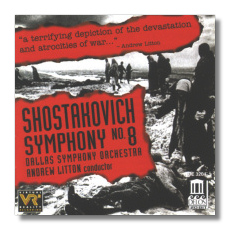
The Internet's Premier Classical Music Source
Related Links
- Shostakovich Reviews
- Latest Reviews
- More Reviews
-
By Composer
-
Collections
DVD & Blu-ray
Books
Concert Reviews
Articles/Interviews
Software
Audio
Search Amazon
Recommended Links
Site News
 CD Review
CD Review
Dmitri Shostakovich

Symphony #8
- Symphony #8 in C minor, Op. 65 (1943)
Dallas Symphony Orchestra/Andrew Litton
Delos DE3204 DDD 59:17
Shostakovich's fifteen symphonies fit nicely into three equal groups: the good (#1, 4, 5, 9 and 15), the bad (#2, 3, 7, 11 and the absolutely awful #12), and the superb (#6, 8, 10, 13 and 14). Of the latter group #8 is, in my view, the greatest. I always welcome a new recording of this powerful, rich, tragic, and enigmatic work. But any new entry must deal with the likes of Järvi/Chandos and Kondrashin/BMG-Melodiya (possibly available only as an import). How does Litton fare against this stiff competition? The answer to that question is more complex than you might think.
First, the sound of Delos's "Virtual Reality Recording" technique here is superb throughout, with detail abounding delightfully. The only sonic drawback is the timpani, which have a rather spongy sound, most especially so in the frenetic climax to the third movement. This flaw may be due more to acoustics or to the drums themselves than to the recording quality. Everything else, though, emerges clearly and in fairly true timbres.
Litton begins the first movement with a deliberate tempo, which allows him to point up the grimness and tension in the string writing. At 4:57 (track 1) he accelerates and maintains the quicker pace for most of the rest of the long, Mahleresque movement. Some may not like this slightly controversial gear shift here, but Litton makes a good case for his approach by maintaining proper orchestral balances and by drawing superb playing from his Dallas players. Almost all conductors of this work that I've heard – Järvi, Haitink, Solti, Rozhdestvenky, Previn, Kondrashin and others – are slower here. The development goes well, with the passage leading to the fugal march, and the march itself, sounding impressive. I do wish, however, the cor anglais solo that follows would have screamed out in a bit more anguish. If the performance were judged on this movement alone, I would give the edge to Järvi and Kondrashin over Litton.
But in the ensuing movements Litton improves. His Allegretto is brilliant and nasty, with much virtuosic orchestral playing; next follows the mad, scherzoish third movement, where the race to the explosive finish line is fraught with suspense and sonic thrills. His Passacaglia is brooding and profound and the finale ghostly and sad, with contrapuntal lines well delineated.
If Järvi's approach can described as weighty and grim, and Kondrashin's as raw and intense, then Litton's is by comparison suave and incisive. If you prefer a more mellow reading of this symphony, then this splendidly recorded Delos disc may be for you. Certainly, if it's not quite at the top of the heap, it's near it, and superior to most other competitors I've heard. Excellent notes by Laurie Shulman.
Copyright © 1997, Robert Cummings


















